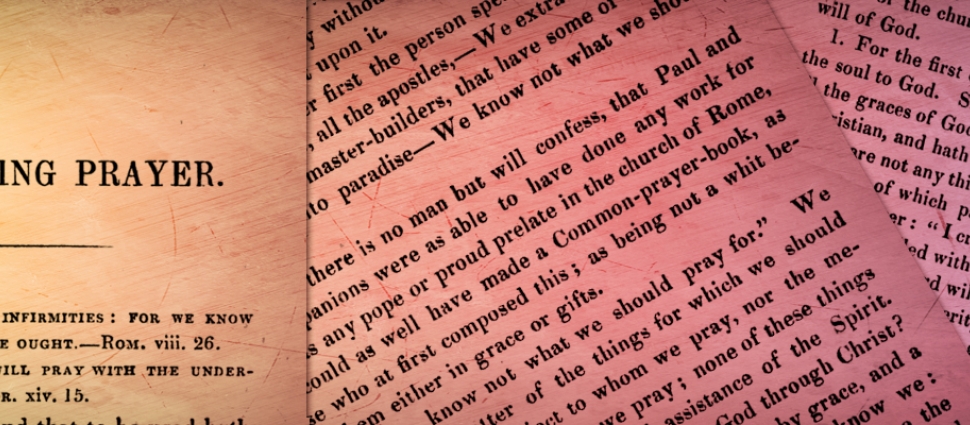John Bunyan on Prayer (1)

Amy Mantravadi joins us this week to discuss John Bunyan's A Discourse Touching Prayer. Read her first post below:
Reading John Bunyan’s A Discourse Touching Prayer is a real pleasure, and not only because it is the first such work I have ever read that includes the phrase, “Therefore give me leave a little to reason with thee, thou poor, blind, ignorant sot.” This treatise, also known as I Will Pray with the Spirit, was composed while Bunyan was imprisoned in 1663. It is an exposition of the Apostle Paul’s statement that “I will pray with the spirit, and I will pray with the understanding also”. (1 Corinthians 14:15 KJV) It contains some of Bunyan’s clearest teachings on prayer, which he defined in the following manner.
“Prayer is a sincere, sensible, affectionate pouring out of the heart or soul to God, through Christ, in the strength and assistance of the Holy Spirit, for such things as God hath promised, or according to the Word, for the good of the church, with submission, in faith, to the will of God.”
Bunyan argued, “Thou then art not a Christian that art not a praying person.” He declared that prayer “is the opener of the heart of God, and a means by which the soul, though empty, is filled. By prayer the Christian can open his heart to God, as to a friend, and obtain fresh testimony of God’s friendship to him.” This type of prayer is much more than a stiff, formal activity. It is an action of both the head and the heart, even as Paul taught.
Bunyan was concerned that prayer in the Church of England had become overly dominated by passionless readings of the Book of Common Prayer. He was so conscious of this problem that he even questioned the regular use of the Lord’s Prayer. He taught that our communication with God had Him as its only hope and focus, and that it most certainly required emotion as well as words. “For right prayer bubbleth out of the heart when it is overpressed with grief and bitterness, as blood is forced out of the flesh by reason of some heavy burden that lieth upon it.” Elsewhere, he wrote, “Many in a wording way speak of God; but right prayer makes God his hope, stay, and all. Right prayer sees nothing substantial, and worth the looking after, but God.” While he certainly believed prayer was the duty of every Christian, Bunyan would not accept any supplications that did not arise out of genuine humility and affection.
“The greatest part of men make no conscience at all of the duty; and as for them that do, it is to be feared that many of them are very great strangers to a sincere, sensible, and affectionate pouring out their hearts or souls to God; but even content themselves with a little lip-labour and bodily exercise, mumbling over a few imaginary prayers. When the affections are indeed engaged in prayer, then, then the whole man is engaged, and that in such sort, that the soul will spend itself to nothing, as it were, rather than it will go without that good desired, even communion and solace with Christ. And hence it is that the saints have spent their strengths, and lost their lives, rather than go without the blessing.”
The beginning of all right prayer, according to Bunyan, was the knowledge of one’s sinful condition and the greatness of God’s mercy. “For mark, I beseech you, there are two things that provoke to prayer. The one is a detestation to sin, and the things of this life; the other is a longing desire after communion with God, in a holy and undefiled state and inheritance.” Furthermore, he stressed that a sense of our guilt should not keep us from praying.
“Thou criest out that thou art vile, and therefore God will not regard thy prayers; it is true, if thou delight in thy vileness, and come to God out of a mere pretence. But if from a sense of thy vileness thou do pour out thy heart to God, desiring to be saved from the guilt, and cleansed from the filth, with all thy heart; fear not, thy vileness will not cause the Lord to stop his ear from hearing of thee.”
Bunyan always sought to make this connection between praying with the spirit and understanding, and he did this by combining a strong doctrinal foundation and a heart that seeks after God.
“It is not the mouth that is the main thing to be looked at in prayer, but whether the heart is so full of affection and earnestness in prayer with God, that it is impossible to express their sense and desire; for then a man desires indeed, when his desires are so strong, many, and mighty, that all the words, tears, and groans that can come from the heart, cannot utter them…”
For subsequent posts in this series, see:
This book is available from Puritan Paperbacks under the title Prayer. As it is in the public domain, it is also freely available in digital form.





